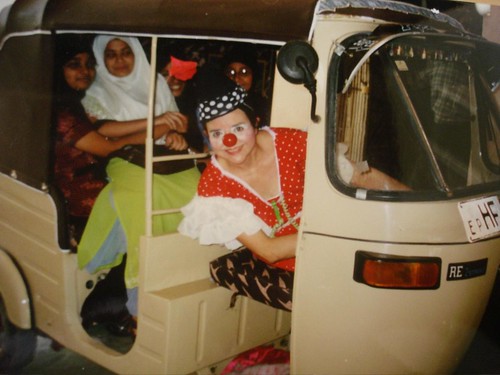(10/5/05) I’m working on a project to publish a book of stories, experiences, anecdotes, excerpts of letters, diaries, and tales of WOMEN TRAVELERS. The idea is to create a space for reflection about women’s travel experiences (traveling alone or with somebody else). Therefore, I don’t only have in mind diplomats, academics, or “adventurers” in general, but also women who travel for religion (Christian missionaries for example) and also workers in the sex trade.
The texts can be written in Spanish, English, French and/or Portuguese. If you know of a women traveler, please send me her email address so that I can get in contact with her.
This first step having been taken, I was asked the same question by several people: What do you mean by “women traveler”????? What is the difference between a tourist and a traveler???? And is this an important question of legitimacy??? Is it possible to talk about this difference??
The blog has no pretensions of being anthropoligical or historical. It simply compiles texts that contribute to the debate and may lead to future travel writing. Is it possible to construct this type of narrative in a time of massive human displacement, largely due to economic and political causes?? What does it mean to travel in our times? How can one avoid the dichotomy of the glamour of the journey and the hatred felt against people who explore??? Finally, what is the meaning of a travel story??
Months went by and I received texts and emails from women travelers. Some had already prepared their texts, others wrote them in response to my request and I wrote them back to tell them my impressions of what they had written:
Dear Kathrin, I really wanted to tell you how much I enjoyed your story. I am reading such wonderful texts, yours included, and finding it exciting and fun. It’s incredible how I can step into the life of a person that I don’t know and read things that are so intimate and so true, and it is impossible not to have an image in my head of the writer. In short, I’m going to work extra hard so that this book is published soon, so that other people can read about the amazing things that are happening to us women. Hopefully, our stories motivate other women to travel, or at least to see that it is a possibility, or to just simply open themselves up to experience the poetry of travel.
Journies are not always associated with a written text. Many women travelers do not record their experiences in written form. Some texts display a higher level of literacy than others. After a year of collecting stories, I wrote the following email to my friends:
I’m writing to fill you in about the WOMEN TRAVELERS project. After one year collecting stories, I now have 19 in total. They are stories about travelers from 14 countries: Poland, Chile, England, Colombia, El Salvador, the United States, France, Peru, Brazil, Belgium, Switzerland, Greece, Ecuador, and China.
There are 9 texts in Spanish, 9 in English, and 1 in French. I still hope to receive a story from an African woman. I am currently looking for a publisher that will finance the book. One of the challenges is that the stories are written in three different languages. I plan to keep looking for a publisher. Nonetheless, if this proves to be impossible, I am thinking that the alternative to publishing a book would be to create a blog, a webpage that displays the original stories. (This would be the second option.) Please advise me if you change your email address, so that I will have your current address when I need to get in touch with you.
Finally, the option of creating a blog occurred to me in January, 2007. The blog is being created as a space for the collection of experiences and discussions about (voluntary) displacement. A good way to read travel narratives may be to look for the tension of the person in motion, the tension that arises between the text and the location being visited, and the people and the ideas that are encountered along the way. This tension is not only present in travel stories. The tension is due to unresolved, and unresolveable, conflict. This tension creates a form of intellectual stimulation and stories of displacement are only one of several different ways to create tension. These stories are not about a lack of belonging, but rather of multiple belonging and multiple instances of not belonging. The feeling of being (and not being) part of everything. The proposal is to construct new ways to be and to feel. Where everywhere is home, but is also hell.
 Marta Sanchez, Clown without borders
Marta Sanchez, Clown without borders
No hay comentarios:
Publicar un comentario